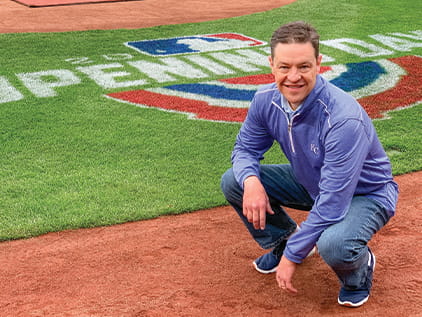April 26, 2022
What’s behind this door? What’s behind this door? Oh yeah, well, what’s behind THIS door?
Chances are, if you’re walking down a certain floor at The University of Kansas Health System Main Campus in Kansas City, the answer might be the lab. If labyrinth is Greek and Latin for “an intricate combination of paths or passages in which it is difficult to find one's way or to reach the exit,” it also describes our laboratory.
Sarah Dillon was our tour guide when Kaitlin Thompson and I tried to get lost in the maze of labs at the health system. Kaitlin recently joined our corporate communications team and is writing articles this week for our employees to educate them on the intricate, confusing and utterly professional labs.
This is Medical Laboratory Professionals Week across the country.
“I found the lab here at the health system 5 and a-half years ago,” Sarah told me, “and I feel like I’ve found my forever home. Working here has opened my eyes to a world of patient care that is typically so behind the scenes that, even though I grew up in and out of hospitals when I was a child, I had NO clue the lab even existed or how many different people and departments make up the lab.”
Now she spends her time telling others. Or better yet, showing them when a tour is appropriate. We started ours in an outpatient clinic that draws blood from thousands of patients each year. Introducing us to Annie Sanders might have been the best part of the tour. Annie related stories about patients so frightened by needles that they had been avoiding critical testing. (Don’t worry. Annie didn’t name names.)
“Having a gentle touch and understanding of how blood collection can be a traumatic experience, especially for those patients with chronic illnesses who have years (even decades) of blood draws, is a vital part of each lab visit experience as just one bad experience can diminish the successful ones,” Annie said.
Having a gentle touch and understanding of how blood collection can be a traumatic experience of blood draws is a vital part of each lab visit experience... just one bad experience can diminish the successful ones. – Annie Sanders
Lab Phlebotomy Supervisor
Labryinth of labs
We hadn’t even gone into the labyrinth of labs yet but well understood the mission of the more than 400 people in the department. They refer to specimens as “patients” – a part of the patient that deserves dignity, respect and answers. From cancers and COVID-19 to blood types and blood sugars and everything in between. And then come the dizzying numbers. They do, on average, more than 4 tests per patient, and that adds up to 5½ million tests a year!
By the time we had walked only a portion of the 46,000 square feet of labs at the Main Campus, we had come across an assembly line of testing and double verification, complex machines they call their “instruments” and the dissection of a colon (it’s called “grossing,” and I didn’t even make a joke).
Mostly, we met intensely professional people who have a passion for this stuff and a sense of humor.
That was pretty evident when some of the instruments were named after rap stars or Maverick and Goose from “Top Gun.”
Actually, that didn’t surprise me. Coming from a newsroom and a broadcast career, I’ve met plenty of pros – medical, law enforcement, other pressure cookers – who have a sharp, even dark, sense of humor. Call it a coping mechanism. Literally, the lives of people hang in the balance of their analysis and attention to detail.
You could say that about every aspect of The University of Kansas Health System. It is on full display in our lab. And that’s no joke.
“Pathology and laboratory medicine play a vital role across the entire continuum of healthcare,” said Dr. Fred Plapp, medical director of clinical laboratories. “Laboratory testing has a major effect on clinical decision making by providing physicians, nurses and other healthcare providers with important information that is needed for the prevention, diagnosis, treatment and management of disease. Nearly every practicing physician depends upon the clinical laboratory for the care of their patient.”
Thank a lab worker today (if you can find them). Or just remember that they’ve been an integral part of your treatment, whatever you’re seeing us for.
Interested in hearing Toby's latest take? Subscribe to follow along.






